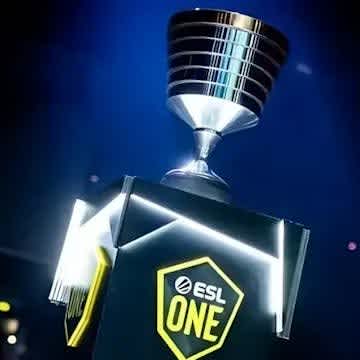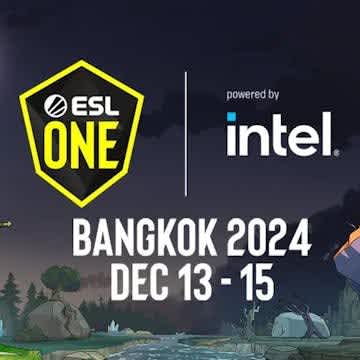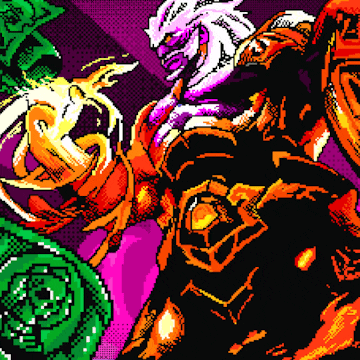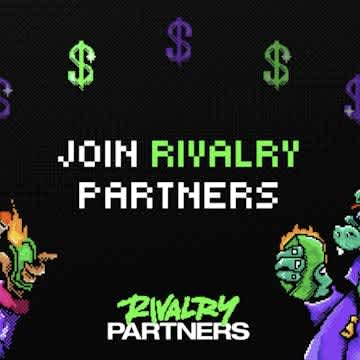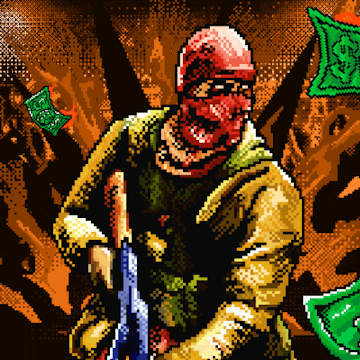Gorgc Leaves OG - Let's Talk Broadcasting Rights in Dota 2
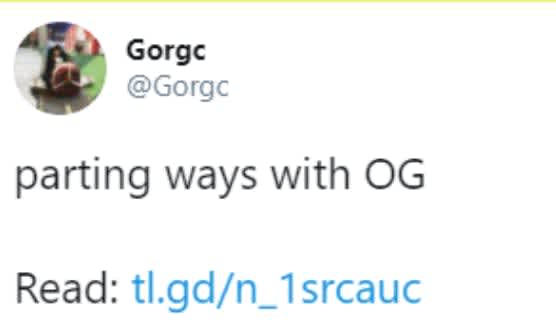
Disclaimer: The views and opinions expressed in this article are those of the author and do not necessarily reflect the viewpoints of Rivalry.
Gorgc Leaves OG Over Casting Issues (Partially)
Recently, popular streamer Gorgc released a Twitlonger in which he stated "unfortunately what we set out doing in the start of me signing with OG to cast their games, has changed a lot when they started being involved in organising tournaments."
Again and again, the community has discussed third party casters vs tournament organizers, which just about anyone involved on the tournament side pointing out how the lack of exclusive broadcast rights impact budgets for tournaments, and many in the community trending towards the free market/competition arguments. Previously, OG had clearly hired Gorgc (in part) to cast their games and provide unqiue fan interactions - something that directly competes with tournament streams . Now that OG has a vested stake in a major tournament (The Omega League) - Gorgc was no longer casting it. (It seems Bulldog hasn't been covering the Alliance games either). Based on the twitlonger, it looks like that casting decision was one of the main reasons for Gorgc and OG parting ways. (Obviously if there were events, Gorgc would likely have been there in person creating content, so that also factors into it).
Anyways, this decision seems like a very very clear message: It's okay to be a competing third party streamer, as long as you aren't involved in the tournament. Now that OG (and Alliance) have a stake? Looks like those third party streams aren't such a good idea anymore. I decided it would be a good idea to go through the history of broadcast rights and third party streamers in Dota 2, so everyone has a decent overview of the storylines.
If you would prefer a video form, the video is below outlines everything we will hit in this article, with timestamps, sources, and links in the video description if you go over to YouTube.
Back to the Beginning: Starladder Threatens Bulldog
Broadcast rights became a point of contention during the inaugeral event of the brand new DPC system in 2017 at the StarLadder i-League Invitational Season 3 when Starladder tried to threaten Bulldog for streaming their tournament. As a beloved caster, TI winner, and provider unique perspective on ongoing tournaments - the community wasn't very happy with this threat.

Valve Responds Quickly to Establish Broadcast Rights in Dota
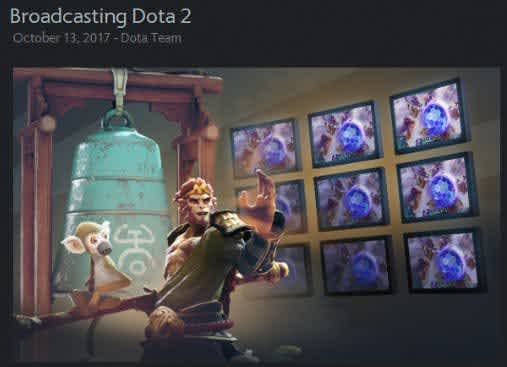
We tend to try to tread pretty lightly around areas where the community outside of Valve is doing a lot of the work, primarily because we don’t want to stifle invention that leads to someone doing something really cool.
Valve responded almost immediately to the controversy to establish and protect broadcast rights in Dota. Broadcast rights for third party streamers, not the tournaments. Their blog post outlined their approach towards community content, noting that "We tend to try to tread pretty lightly around areas where the community outside of Valve is doing a lot of the work, primarily because we don’t want to stifle invention that leads to someone doing something really cool."
Considering their approach around the workshop, lore, highlights, tournaments, short films and every other form of content - this makes sense. Valve benefits greatly from community innovation, design, and not having to hire people on staff to handle content when their focus is on development. This led them to ultimately saying that non-commercial broadcasts from DotaTV that don't use any caster audio or camera movement and are not sponsored or monetized are allowed.
To that end, in addition to the official, fully-produced streams from the tournament organizer itself, we believe that anyone should be able to broadcast a match from DotaTV for their audience. However, we don’t think they should do so in a commercial manner or in a way that directly competes with the tournament organizer’s stream. This means no advertising/branding overlays, and no sponsorships. It also means not using any of the official broadcast’s content such as caster audio, camerawork, overlays, interstitial content, and so on. Finally, this is not permission for studios to broadcast each other’s events. In general, everyone should play nice together, and we think the boundaries should be pretty clear.
Seems clear to you? Well, turns out, it wasn't.
The ESL x Facebook Deal Adds Fuel to the Fire
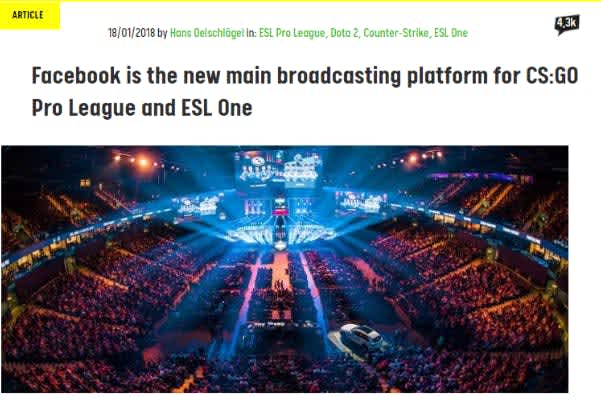
The next chapter in the great broadcast rights debate came in the form of an 'exclusive' broadcast rights deal signed between ESL and Facebook. Facebook was working towards their ability to live stream esports events, and it seemed that ESL was one of their first major test launches. Dota 2 viewers were met with glitched screens, streams that were challenging to even find, and their real names linked to their chat experience. (Plus a lot less emotes, a main stay of the Twitch experience to the vocal fans).
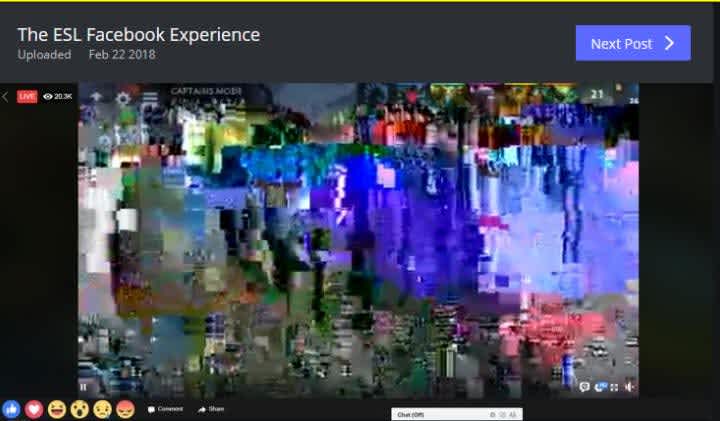

Streamers 'Save the Day' with Twitch Broadcasts
Twitch was flooded with streamers, casters, and players looking to provide a better alternative ESL stream - anything was better than Facebook, even someone in their bedroom with a questionable mic. Or well... they tried. ESL has different ideas as community streamers were hit with DMCAs and temporary Twitch bans.
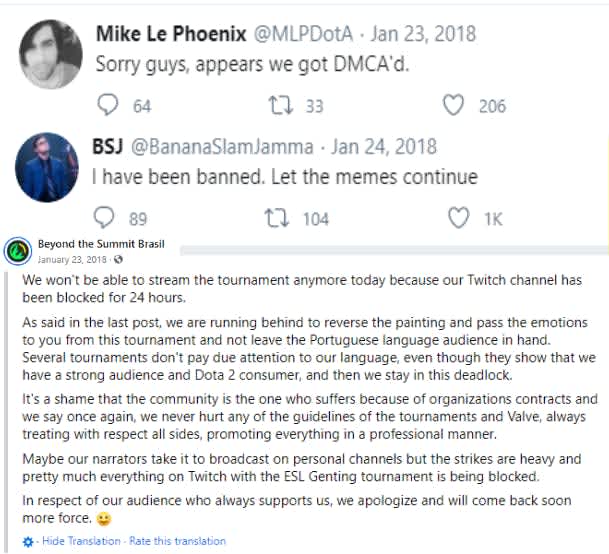
ESL held their ground, insisting that they were following Valve's original guidelines across multiple posts.
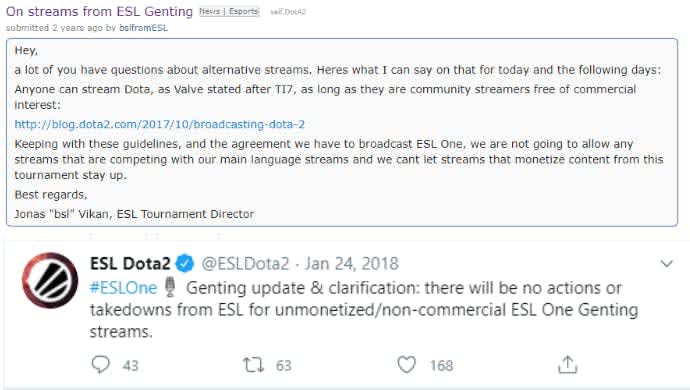
Valve uh... decided they thought differently. In an updated blog post, they stated that "No one besides Valve is allowed to send DMCA notices" and reiterated that community figures and up and coming casters should be allowed to cast matches. Their language does specify that these third party casts should happen occasionally and again states that commercial organizations are not allowed to compete with the primary stream.
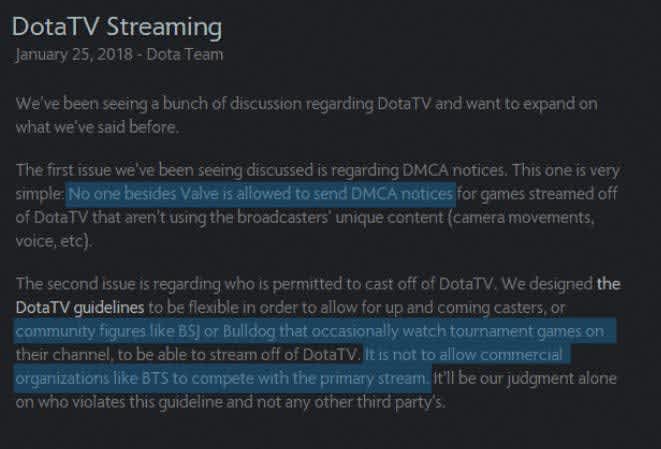
WePlay Didn't Get the Memo and DMCA'ed ColdFox for His Broadcast
WePlay, a TO many view as 'new' to the Dota 2 scene seemed to have missed Valve's memo, and issued a DMCA against a popular caster, ColdFox. (In addition to CIS caster Casper). The reddit debate raged aggressively on both sides - pointing out that DMCAs were not allowed by anyone but Valve, but also pointing out that by ColdFox's own admission, he made his money off of covering games as a third party caster. Kyle condemned streamers for theft of tournament content while Gorgc insisted that he wasn't taking away any viewers from the broadcasts.
An important note, WePlay has been running tournaments in Dota 2 since 2013.
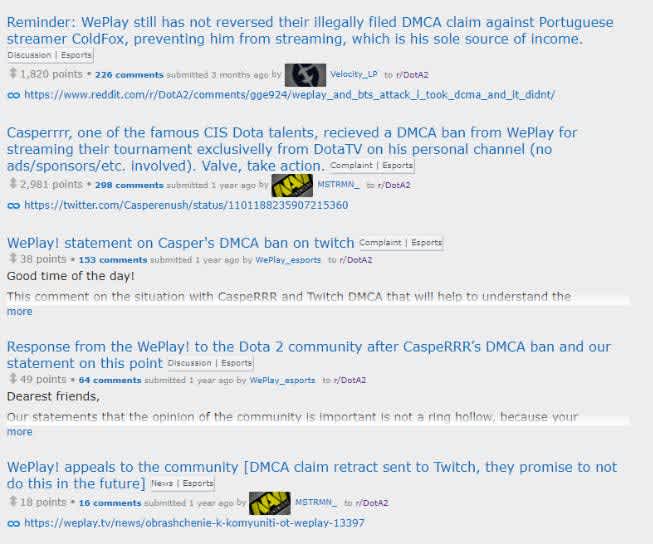
AdmiralBulldog of course had his own opinion about Kyle's statements and the issue of broadcast rights - but he deleted them not too long after tweeting.
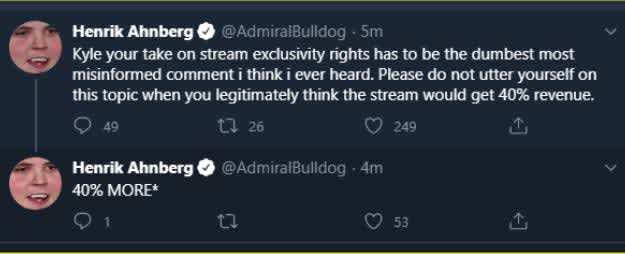
Community opinion went back and forth, with many insisting that if a streamer in their room can provide a better product than the TO themselves, the TO deserves to lose viewers. This opinion is widely shared, but seems a little out of place when discussing the talent roster, stage, production, and content of a WePlay stream (which is what the screenshots from reddit show below are from). This line of thought also fails to take into account the ability of OG to provide players for exclusive content to a Gorgc stream - which seems a lot like a commercial organization directly competing with the main stream?
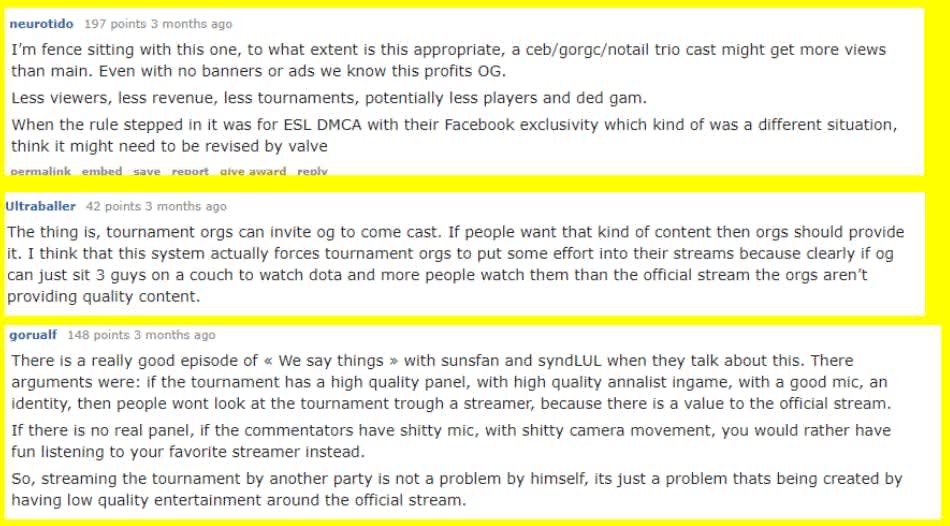
Why are Broadcast Rights Relevant with Gorgc Leaving OG?
The reason that broadcast rights are fascinating to bring up again? The top teams have banded together to create the Omega League, a league where the teams themselves have a share/stake in the tournament's success, in addition to competing for the prize pool. Interesting that Bulldog and Gorgc, who have been defended as an alternative to the main cast, not taking away views, and not competing with the main stream, have 'chosen' not to cast the Omega League games.

Gorgc states in his twitlonger that he had originally signed with OG in order to cast their games, but now that he can't because of their tournament involvement, the partnership no longer makes sense.
OG signed Gorgc in order to provide exclusive fan content with their players, content that is not on the broadcast for the tournament that is offering large sums of prize money to these teams. OG is a commercial organization that is sponsoring the coverage of their games. Suddenly, when OG is the commercial organization they would be competing against, they choose to no longer offer that exclusive fan content through Gorgc.
This is the reason that this discussion is incredibly compelling right now. We don't know if OG themselves have made this ruling or if this was a stipulation of WePlay before they agreed to work with the teams. No matter what the reason, this is a clear signal that broadcast exclusivity is likely playing an important role in tournament monetization and sponsorship value. Which begs the question - why does Valve continue to limit the ways in which tournaments can monetize?
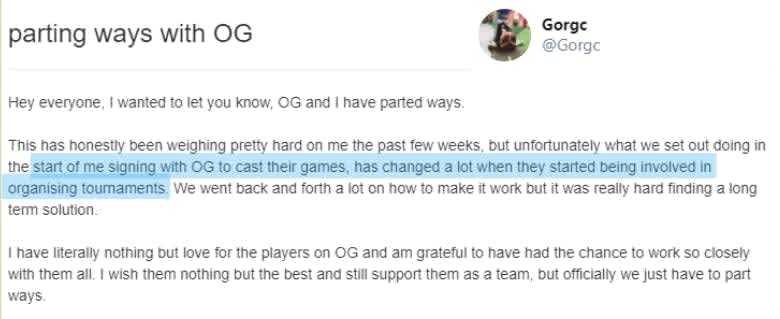
Tournaments NEED Better Revenue Options
This all boils down to the fact that Dota 2 either needs to rework their broadcast rights system, or tournaments need significantly better discoverability and monetization options. Pause screens could have simple GIF ads instead of mini games, in game space could have advertising baked in, loading screens could be video ads - meaning that anyone who watches DotaTV has sponsorship advertising up.
Third party casting could be limited to non-partnered streamers, or stricter rulings on competing organizations (like OG and Bulldog) having streamers covering the games. TOs could be promised platform exclusivity, with third party casts allowed on other platforms .
Proper ticketing, stream embeds, working with Twitch to highlight official coverage, the return of compendiums - all of these would help with the promotion, awareness, and viability of TOs.
(The above are options, not a list of every single thing that I think needs to be done - just food for thought)
People complain about a dying tier 2 scene and in the same breath defend third party streams to the death and insist TOs become more entertaining and innovative. It is time to fix this system and give TOs the incentive and ability to expand their tournament offerings while also creating products that viewers enjoy and actually know about. In no way am I saying that TOs aren't partially to blame here - there has been a stagnation in the tournament landscape for a while, but they face immense risk even in running an event.
I am sure the solutions aren't simple, but we haven't had any update or changes for about 2.5 years. It seems like it might be time.

